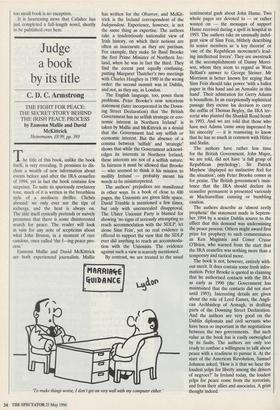Judge a book by its title
C. D. C. Armstrong
THE FIGHT FOR PEACE: THE SECRET STORY BEHIND THE IRISH PEACE PROCESS by Eamonn Mollie and David McKittrick Heinemann, £8.99, pp. 393 The title of this book, unlike the book itself, is very revealing. It promises to dis- close a wealth of new information about events before and after the IRA ceasefire of 1994, yet in fact the book contains few surprises. To suite its spuriously revelatory tone, much of it is written in the breathless style of a mediocre thriller. Cliches abound: we only ever see the tips of icebergs, and the heat is always on. The title itself cynically pretends or naively presumes that there is some disinterested search for peace. The reader will look in vain for any note of scepticism about what John Bruton, in a moment of rare candour, once called 'the f—ing peace pro- cess.'
Eamonn Mallie and David McKittrick are both experienced journalists. Mallie has written for the Observer, and McKit- trick is the Ireland correspondent of the Independent. Experience, however, is not the same thing as expertise. The authors take a tendentiously nationalist view of Irish history, on which their notions are often as inaccurate as they are partisan. For example, they make Sir Basil Brooke the first Prime Minister of Northern Ire- land, when he was in fact the third. They find the recent past equally confusing, putting Margaret Thatcher's two meetings with Charles Haughey in 1980 in the wrong order: the second summit was in Dublin, and not, as they say, in London.
The English language, too, poses them problems. Peter Brooke's now notorious statement (later incorporated in the Down- ing Street Declaration) that 'the British Government has no selfish strategic or eco- nomic interest in Northern Ireland' is taken by Mallie and McKittrick as a denial that the Government had any selfish or economic interest. But the absence of a comma between 'selfish' and 'strategic' shows that while the Government acknowl- edges its interests in Northern Ireland, these interests are not of a selfish nature. In fairness it must be allowed that Brooke — who seemed to think it his mission to mollify Ireland — probably meant his words to be misinterpreted.
The authors' prejudices are manifested in other ways. In a book of close to 400 pages, the Unionists are given little space. David Trimble is mentioned a few times, but only with unconcealed disapproval. The Ulster Unionist Party is blamed for showing 'no signs of seriously attempting to reach accommodation with the SDLP, let alone Sinn Fein', yet no real evidence is offered to support the view that the SDLP ever did anything to reach an accommoda- tion with the Unionists. The evidence against such a view is scarcely mentioned.
By contrast, we are treated to the usual To make things worse, I don't get on very well with my computer either.' sentimental gush about John Hume. Two whole pages are devoted to — or rather wasted on — the messages of support Hume received during a spell in hospital in 1993. The authors take an unusually indul- gent view of Sinn Fein, blithely describing its senior members as 'a key theorist' or 'one of the Republican movement's lead- ing intellectual forces'. They are awestruck at the accomplishments of Danny Morri- son, whom they seem to regard as West Belfast's answer to George Steiner. Mr Morrison is better known for urging that Sinn Fein should take power 'with a ballot paper in this hand and an Armalite in this hand'. Their admiration for Gerry Adams is boundless. In an exceptionally sophistical passage they excuse his decision to carry the coffin of Thomas Begley, the IRA ter- rorist who planted the Shankill Road bomb in 1993. And we are told that those who have met Adams 'came away impressed by his sincerity' — it is reassuring to know that he has so much in common with Hitler and Stalin.
The authors have rather less time for the British Government. John Major, we are told, did not have 'a full grasp of Republican psychology'; Sir Patrick Mayhew 'displayed no instinctive feel for the situation'; only Peter Brooke comes in for praise. The British government's insis- tence that the IRA should declare its ceasefire permanent is presented variously as Machiavellian cunning or bumbling caution.
The authors describe as 'almost eerily prophetic' the statement made in Septem- ber 1994 by a senior Dublin source to the effect that this demand was undermining the peace process. Others might award first prize for prophecy to such commentators as Ken Maginnis and Conor Cruise O'Brien, who warned from the start that the IRA ceasefire was nothing more than a temporary and tactical move.
The book is not, however, entirely with- out merit. It does contain some fresh infor- mation. Peter Brooke is quoted as claiming that he authorised contacts with the IRA as early as 1990 (the Government has maintained that the contacts did not start until 1993). Interesting details are given about the role of Lord Eames, the Angli- can Archbishop of Armagh, in drafting parts of the Downing Street Declaration. And the authors are very good on the Dublin diplomats and civil servants who have been so important in the negotiations between the two governments. But such value as the book has is easily outweighed by its faults. The authors are only too ready to confuse a willingness to talk about peace with a readiness to pursue it. At the start of the American Revolution, Samuel Johnson asked, 'How is it that we hear the loudest yelps for liberty among the drivers of negroes?' In Ireland today, the loudest yelps for peace come from the terrorists, and from their allies and associates. A grim thought indeed.


























































 Previous page
Previous page